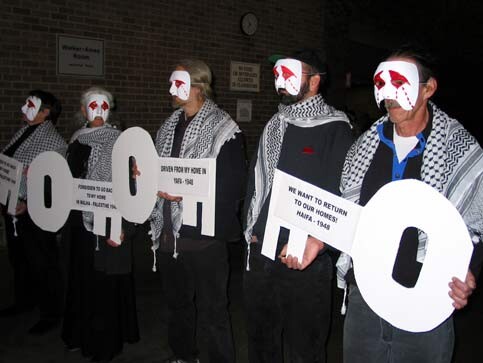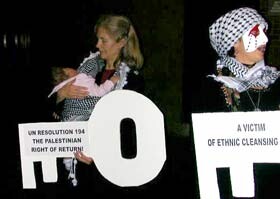The Electronic Intifada 7 November 2003

Members of the Seattle branch of the Palestine Solidarity Committee hold keys that represent the keys still held by Palestinian refugees during the vigil. (John Reese)
Seattle’s Palestinian community, together with Arab and American supporters of the Palestinian cause, have expressed clear opposition to the Nusseibeh-Ayalon “peace proposal” which dismisses the rights of Palestinian refugees to return to their homes. Sari Nusseibeh and Ami Ayalon came to the University of Washington - Seattle on October 23rd, 2003, to present their plan, and were met with visible opposition from local community groups.
Several groups, including Voices of Palestine, Palestine Solidarity Committee, American-Arab Anti-Discrimination Committee, and the Muslim Students Association put on a silent vigil at the event and passed out a flyer presenting a unified statement of their views regarding peace with justice. This statement, viewable online at www.hayaat.org, differs from the Nusseibeh-Ayalon proposal in that it upholds international law and promotes co-existence and the protection of human rights for everyone, including the right of refugees to return to their homes.
Participants in the vigil used dramatic techniques, standing silently in all-black attire and white face masks with red teardrops, and traditional black-and-white kaffiyas. Many held huge cardboard keys symbolizing the keys that so many Palestinian refugees still carry to this day, inscribed with phrases such as “Forced to flee my home in 1948,” “Living in exile for 54 years now” and “Waiting to return to my home.” To add to the visual impact, some activists held large pictures of destroyed homes and villages, one subtitled “Palestinian Holocaust.” Many audience members in line nodded in a supportive way, or flashed the peace sign, while a few seemed irritated.
Sari Nusseibeh, the Palestinian Authority’s former representative in Jerusalem and now Dean of Al-Quds University, and Ami Ayalon, former head of the Israeli Shin Bet security service, claim that their “peace proposal” lays out the foundations for a final settlement between Israel and the Palestinian people. However, the proposal violates at least one of the basic human rights of the Palestinian refugees who were forced to flee their homes in 1948. For this reason, the proposal is generating vehement opposition by many Palestinians and human rights activists.
The Nusseibeh-Ayalon proposal, entitled “The People’s Voice,” was signed by the two men in July 2002, and is viewable on the campaign’s website at www.mifkad.org.il/eng. It is just one page long, and consists of six principles:
- The acceptance by both sides of two states for two peoples.
- Borders on the basis of the 1967 lines, with some territorial exchanges.
- Jerusalem to be a shared open city, capital to both states, accessible to all faiths.
- Refugees to be compensated by the international community, but only allowed to return to the Palestinian state. Jews only will be allowed to immigrate to the Israeli state.
- The Palestinian state will be demilitarized, with security guaranteed by the international community.
- An “end of conflict” agreement will be signed voiding any further claims.
Principle 4 represents a formal relinquishment of the rights of Palestinian refugees to return to their homes that they were driven out of in 1948, in what is now Israel. At that time, European Jewish immigrants used violent tactics to drive out the Palestinian population, including forcible evictions (often at gunpoint), attacks by terrorist gangs, and wholesale massacres—such as the Deir Yassin massacre, where more than 100 villagers were systematically butchered by militias headed by Menachem Begin (who later became Israel’s Prime Minister). As a result, almost 800,000 Palestinians fled their homes, many with just the shirts on their backs, and more than 400 Palestinian villages were razed to the ground.

A mother carries a key that bears the text of United Nations resolution 194, calling for the right to return. (Rob Becker)
The realization of this dream is a not just an idealistic hope but a fundamental human right, promised by the Universal Declaration of Human Rights, which states that “Everyone has the right to leave any country, including his own, and to return to his country” (Article 13). The International Covenant on Civil and Political Rights, passed by the United Nations General Assembly in 1966, stipulates that “No one shall be arbitrarily deprived of the right to enter his own country” (Resolution 2200). And UN General Assembly Resolution 194, specifically formulated for the Palestinian issue, resolves that “The refugees wishing to return to their homes and live in peace with their neighbors should be permitted to do so at the earliest possible date, and compensation should be paid for the property of those choosing not to return and for loss of or damage to property.” Furthermore, the Fourth Geneva Convention ascertains that these “inalienable” rights cannot be bargained away by anyone.
Ayalon described the Israeli compromise of withdrawing their illegal settlements in the occupied Palestinian territories as a painful one, and equivalent to the Palestinian surrender of the their right of return. However, Ed Mast, co-founder of the Palestine Information Project, explained that, in effect, the Palestinians are being asked to choose between peace and their legal and moral rights, while the parallel choice posed to the Israelis is between peace and ethnic supremacy - a false equation that undermines the proposal morally and practically. Other proposals that do not rest on this inequality include one that allows Palestinians the option of living in Israel, as Palestinian citizens living under Israeli law, and vice-versa.
Nusseibeh’s willingness to bargain away his people’s rights has made him very popular in Israel and the United States, particularly among parties that claim to be seeking peace, but in fact are working to solidify the status quo of occupier versus occupied: a secure Israel versus a dispossessed Palestine. Those in favor of the status quo include the U.S. government, mainstream media, and groups that profess to be “peace groups.”
One such group is Seattle-based “Find Common Ground,” (FCG) headed by church pastor Jack Olive and coordinated by a sixteen-member steering committee, almost half of whom are Israelis and the remainder American Protestants, Catholics, and Jews. FCG has been working for many months on organizing a “peace conference” and eventually invited local Palestinians and Arabs apparently in an attempt to legitimize their work with token representation. The Palestinian participants faced considerable resistance to their suggestion that the statement of principles replace the word “peace” with “a just peace.” Israeli members argued that the word “just” could have undesirable implications, but finally acquiesced to the change. However, when the Palestinians insisted that Nusseibeh should be replaced with a different Palestinian speaker in order to achieve a platform based on justice and human rights, they were politely kicked out.
Although FCG’s “peace conference” may or may not materialize, the group proceeded with the Nusseibeh-Ayalon presentation, fully aware of the local Palestinian community’s opposition to it, and of its incompatibility with international law, human rights, or “a just peace.” Clearly, FCG was more concerned with serving Israeli interests than defending Palestinian human rights, and the fact that Nusseibeh is Palestinian enabled them to work under the guise of seeking the best interests of both sides.
And so, Nusseibeh and Ayalon were invited to speak at the University of Washington, as part of an international campaign to garner support for the plan, which also included meetings with U.S. government officials and earned the praise of Deputy Defense Secretary Paul Wolfowitz. The pair also met with UN Secretary General Kofi Annan, who applauded both this proposal and the similar Geneva Accord, even though both contradict UN resolutions, international law, and human rights.
Nusseibeh and Ayalon claim to have secured more than 80,000 Israeli signatures and 60,000 Palestinian signatures. An overwhelming majority of the Palestinian community in Seattle has stood up to oppose this proposal, as have Palestinians all over the world. The Palestinian signatures amount to less than 1% of the total Palestinian population, and it is hard to imagine that the proposal would get much more support than that.
Following are some observations from local community activists:
- Nuha Mousa, a member of Voices of Palestine, stated that “nobody has the right to decide about the right of return except the refugees themselves. Our people have fought for a long time, and thousands have been killed, imprisoned, injured, lost their homes, been deported, all in the struggle for freedom and for the return of our people to their homeland. Neither Nusseibeh nor the Palestinian Authority have the right to throw that away.”
- Ayman Aldahleh, a board member of the American-Arab Anti-Discrimination Committee - Seattle chapter, said that “Palestinians, Israelis and anyone else trying to bring about a peaceful solution in the region should not give in to the brutal power of the Israeli army, but instead stand firm and ask for justice to be served, human rights to be respected, and refugees to return to their homeland. Anything short of that is immoral.”
- Linda Bevis, co-founder of the Palestine Information Project, observed that “Such an agreement would be like someone else deciding - without your permission - that you are going to waive your right to life or due process, for instance. It’s not humane, ethical, moral, or legal.”
- Carla Curio, a peace activist who has volunteered with the International Solidarity Movement in Palestine several times, remarked that “Ami is coming from a place of power where Israel gets to call all the shots and appears to give up a lot (the settlements), while Sari has no choice but to take what is offered and is rolling over.” Curio noted that Nusseibeh has admitted that “this is not about justice or rights,” and she concluded that the proposal failed to achieve an atmosphere of reconciliation.
- Meg Savlov, a member of Jewish Voices Against the Occupation, was shocked by Ayalon’s argument equating the dismantlement of illegal settlements with the Palestinians conceding the right of return. She countered that the Palestinian right of return was inviolable, whereas the illegal settlements had been “been placed there and encouraged by the Israeli government as part of a program to further dispossess the Palestinians.”
- John Glansbeek, a member of the Palestine Solidarity Committee (PSC), pointed out that the denial of the refugees right to return is, “in effect, a ratification of ethnic cleansing.” Linda Jansen, also with PSC, concurred that “this is a continuation of the ethnic cleansing policy that has always been at the heart of the Zionist project in Palestine.” Jansen pointed to the double standard of American Jews demanding the return of Jewish property confiscated by the Polish government, while Israel denies the Palestinian refugees that same right.
- Lana Habash, a UW School of Law alumna, said that “a peace agreement based on the Nusseibeh-Ayalon proposal, or the similar Geneva Accord, would be illegal under international law. It’s a shame that the Palestinian Authority seems willing to collaborate with Israel in committing further injustices against our people. Palestinians and their supporters everywhere need to combat such efforts and defend the rights of the refugees to return to their homes.”
Perhaps Hadi Armouche, President of the Muslim Students Association at the UW, made the most succinct point. Dismayed by the proposal because it puts Israeli concerns ahead of the most basic of Palestinian human rights, Armouche summed up that the Nusseibeh-Ayalon plan “is doomed to fail.”
Related Links
Haithem El-Zabri is the editor and webmaster of AlAqsaIntifada.org


